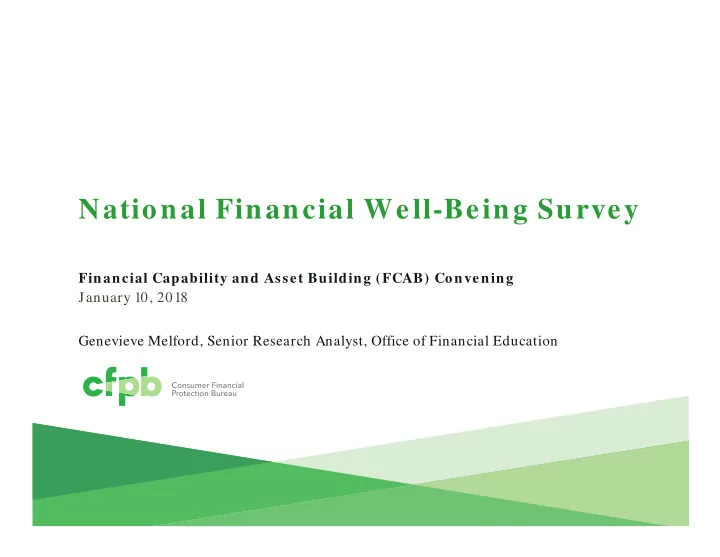

National Financial Well-Being Survey Financial Capability and Asset Building (FCAB) Convening January 10, 2018 Genevieve Melford, Senior Research Analyst, Office of Financial Education
This presentation is being made by a Consumer Financial Protection Bureau representative on behalf of the Bureau. It does not constitute legal interpretation, guidance or advice of the Consumer Financial Protection Bureau. Any opinions or views stated by the presenter are the presenter’s own and may not represent the Bureau’s views.
What is financial well-being? A state of being reflecting a person’s ability to m eet current and ongoing financial obligations, feel secure in their financial future, and m ake choices that allow enjoym ent of life. Present Future Control over your Capacity to absorb a Security day-to-day, month- financial shock to-month finances Freedom of Financial freedom to On track to meet make choices to your financial goals choice enjoy life
The CFPB Financial Well-Being Scale Questions Response Options How well does this statement describe you or your situation? Describes me 1. I could handle a major unexpected expense completely 2. I am securing my financial future Describes me very well 3. Because of my money situation, I feel like I will never have the Describes me things I want in life somewhat 4. I can enjoy life because of the way I’m managing my money Describes me very little 5. I am just getting by financially Does not describe me 6. I am concerned that the money I have or will save won’t last at all How often does this statement apply to you? Always 1. Giving a gift for a wedding, birthday or other occasion would put a Often strain on my finances for the month Sometimes 2. I have money left over at the end of the month Rarely 3. I am behind with my finances Never 4. My finances control my life
What influences financial well-being? Knowledge and skills What you know, and what you know how to do. Personality Behavior What you and attitudes How you tend to actually do. Social and think, feel, and act. economic environment Decision context How a particular What surrounds decision is you in your family Personal financial presented. and community. well-being How satisfied you are with your Available opportunities financial situation. What options are open to you.
National Financial Well-Being Survey A nationally representative survey of almost 6,400 adults 18+, including questions on topics such as… Category Measures Financial status and CFPB Financial Well-being Scale and Score ; ability to meet basic needs; experience of material hardship circumstances Individual characteristics Education; Age; Physical health; Race/ethnicity; and Sex Household and family Housing satisfaction; Housing status; Marital status; Financially supporting children; Census region characteristics Income and employment Employment status; Household income; Federal poverty status; Income volatility; Receiving Social Security retirement benefits; characteristics Military service (service member or dependent); Veteran status; Employer-provided benefits Liquid savings; Ability to absorb an unexpected expense; Have non-retirement investments; Have health insurance; Have Savings and safety nets friends/family safety net for emergency needs Turned down for credit; Contacted by debt collector; Have checking or savings account; Use non-bank, short-term credit; Use non- Financial experiences bank transaction product; Housing cost burden; Negative financial services experience; Experienced any negative financial shocks; Have student loan; Financial socialization; Responsibility for own finances Financial behaviors, skills, and Confidence in ability to achieve a financial goal; Have a habit of saving; Effective day-to-day money management behaviors; attitudes Planning horizon of 5+ years; Propensity to plan for finances; Financial knowledge; Financial skills
Financial well-being varies widely 30% 22% 21% 10% 9% 3% 3% 1% 1% 11 to 20 21 to 30 31 to 40 41 to 50 51 to 60 61 to 70 71 to 80 81 to 90 91-100 Financial well-being score ranges Percent of U.S. adult population Financial well-being score range Financial circumstances with scores in this range Nearly universal financial ≤ 40 13% insecurity Large majority experiences 41 to 50 21% financial insecurity A majority are not in financial 51 to 60 30% distress Large majority experiences 61 to 70 22% financial security Nearly universal financial >70 14% security
Opportunities to improve financial well-being • Many characteristics associated with financial well-being are the target of financial capability programs: • The strongest relationships to financial well-being appear to be related to savings and safety nets • Certain experiences with debt and credit seem to be strongly – and negatively – associated with financial well-being • Many of the strongest positive relationships with financial well-being correspond to financial attitudes, behaviors, and skills • A growing body of evidence exists on effective strategies to improve financial decision-making and financial outcomes. • However, more research is needed on what drives financial well- being and innovative approaches to improve it.
Public use data file consumerfinance.gov/ data-research/ financial-well-being-survey-data/
Types of variables in the data file Demographic and household characteristics Financial product ownership and use Financial circumstances, resources and social networks Financial behaviors and experiences, including financial socialization Time orientation and discounting Objective and subjective numeracy and financial knowledge; financial skill Financial attitudes (e.g. confidence, frugality, materialism) Health (physical, cognitive, stress level) * The public use data file does not include personally identifying information.
Interactive consumer tool consumerfinance.gov/ consumer-tools/ financial-well-being/
Resources Financial w ell being: The goal of financial education consumerfinance.gov/ data-research/ research-reports/ financial-well-being/ CFPB Financial Well-Being Scale: Scale developm ent technical report consumerfinance.gov/ data-research/ research-reports/ financial-well-being-technical-report/ CFPB Financial Well-Being Scale: User guides, questionnaires, and scoring materials consumerfinance.gov/ data-research/ research-reports/ financial-well-being-scale/ Financial Well-Being in Am erica consumerfinance.gov/ data-research/ research-reports/ financial-well-being-america/ National Financial Well-Being Survey public use data file consumerfinance.gov/ data-research/ financial-well-being-survey-data/ Financial well-being consumer tool consumerfinance.gov/ consumer-tools/ financial-well-being/
Recommend
More recommend